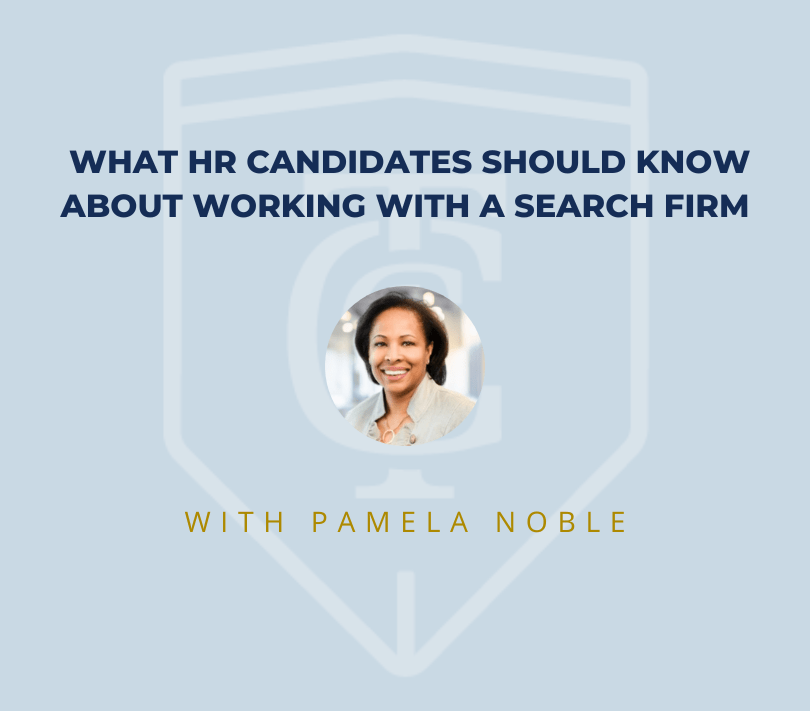
If you’ve been in Human Resources for any length of time, chances are you’ve had at least some interaction with an executive search firm. Maybe you’ve been contacted about a role that wasn’t quite right. Maybe you’ve worked with a firm to fill a key position on your team. Or maybe you’re actively exploring your next chapter and wondering what working with a recruiter really looks like.
I’ve worked in HR for decades, both in-house and now on the executive search and consulting side, and I can tell you this: relationships with search partners matter. Whether you’re actively looking or just open to having a conversation, understanding how search firms operate, and what you can do to build a strong partnership, can make all the difference. Here’s what I think every HR leader should know:
- We work for the client, but we care deeply about the candidate.
This is a common misunderstanding. Our firm is hired by a client to run a specific search, and our job is to find the right match for that company’s needs, culture, and goals. That said, we don’t treat candidates like a transaction. We act as advocates, advisors, and often, a steady friend along the way. We’re here to support you throughout the process, helping you navigate the ups, the unknowns, and the decisions that come with big change. Because your long-term success is our long-term success. This work is personal, and we take that seriously.
- Search isn’t a science, it’s a craft.
There’s no formula that guarantees a perfect match. A candidate might have an impressive resume, check all the technical boxes, and still not be the right fit, for reasons that won’t show up on paper. Maybe they’re looking for an HR-forward culture, but the organization is still growing in that space. Maybe they thrive in a big, matrixed environment, and the client is a lean, hands-on team. Beyond qualifications and experience, we’re looking for something harder to define: the chemical fit. That feeling when the values, energy, and expectations align, for both sides. Our role is to see both sides clearly and make the best match for both. Success isn’t just about filling the role, it’s about making a connection that works long term. One where the company grows, and the candidate thrives. That’s when we know we’ve done our job well.
- You don’t need to be actively looking to benefit from a search conversation.
Some of the best introductions I’ve made started with a candidate saying, “I’m not looking, but I’m curious.” That’s more than okay, it’s actually ideal. The more we understand your background, career goals, and motivations, the better we can keep you in mind when the right opportunity shows up. And if nothing fits right now? That connection still matters. I’ve had conversations with candidates that don’t turn into placements for years, and then suddenly, the stars align.
- Be honest: about what you want, what you don’t, and where you’re flexible.
Search firms aren’t trying to shoehorn people into jobs that don’t fit. Our goal is long-term success, for both candidate and client. So when we ask what excites you about a role, or what might give you pause, we’re not just filling in a form. We’re building a profile that helps us advocate for you. Transparency helps us help you, always.
- You don’t need to have it all buttoned up. You just need to be real.
We’re not looking for a perfect resume or a rehearsed answer to “Tell me about yourself.” We’re looking for substance: how you think, lead, and solve problems. What you value in a culture. What kind of leader you are. When you show up authentically, we get a clearer picture of how you’d show up for the client, and that’s what they’re hiring.
- Stay in touch. Even when you’re not on the market.
We don’t expect people to update us every time something changes in their lives. But if you’ve taken on a major new responsibility, moved into a different industry, or started thinking about your next role, let us know. Executive search is all about timing, and those small updates can make a big difference when we’re putting together a slate for a new search.
- A good recruiter will tell you the truth, even when it’s hard to hear.
Sometimes you’re not the right fit for a role. Sometimes the client goes in a different direction. Sometimes you might need to rethink how you’re showing up in interviews. The best recruiters will give you that feedback with respect, because it’s meant to help, not to critique. If you’re working with someone who’s direct but kind, you’re in good hands.
- This isn’t just about a job. It’s about your career.
When you’re exploring a new opportunity, especially one that could move you up, across industries, or into a different kind of organization, you want someone in your corner who understands the landscape. That’s what we’re here for. At TCG, every one of us has sat in HR seats ourselves. We’ve made the tough calls. We’ve navigated the same transitions. That perspective allows us to guide candidates with empathy and precision.
Whether you’re actively in the market or just sensing that change may be on the horizon, a trusted search partner can help you navigate the journey with clarity and confidence. My best advice? Don’t wait until you need a job to build those relationships. Connect early, show up honestly, and treat the process like a two-way conversation. That’s how great partnerships, and great placements, are made.
About Pam Noble
 Pam joined The Christopher Group in 2019 as the President of the Consulting Services Division and Chief Human Resource Officer. She now serves as a Managing Partner, President, Executive Recruiting Solutions & Engagement, Culture, Belonging & Inclusion Practice Leader. With over 25 years of comprehensive human resource leadership, Pam currently leads the Executive Solutions and DEIB Practice. Her extensive experience as a former CHRO and Chief Talent Officer has enabled her to build HR departments as strategic partners, enhance corporate-wide employee engagement, and spearhead DEIB initiatives—all while maintaining a reputation for high personal integrity.
Pam joined The Christopher Group in 2019 as the President of the Consulting Services Division and Chief Human Resource Officer. She now serves as a Managing Partner, President, Executive Recruiting Solutions & Engagement, Culture, Belonging & Inclusion Practice Leader. With over 25 years of comprehensive human resource leadership, Pam currently leads the Executive Solutions and DEIB Practice. Her extensive experience as a former CHRO and Chief Talent Officer has enabled her to build HR departments as strategic partners, enhance corporate-wide employee engagement, and spearhead DEIB initiatives—all while maintaining a reputation for high personal integrity.
Pam has a Doctorate in Transformational Leadership and Coaching from MIU, where her dissertation focused on unconscious bias. To learn more about Pam visit her bio page.

